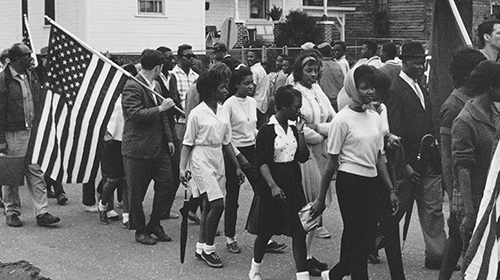
This was originally posted on .
On this day in 1960, white police officers in Sharpeville, South Africa, opened fire on a peaceful anti-apartheid demonstration killing 69 black South African protestors. To mark the solemn occasion of what came to be known as the "Sharpeville Massacre," the international community proclaimed this day as the Γאף an occasion to amplify efforts to eliminate racism.
Closer to home, today is a particularly appropriate time to remind the Obama administration that it needs to make good on a promise it made to the international human rights community to come up with a concrete plan to battle discrimination and fully comply with its obligations under the , also known as ICERD.
When it comes to racism, putting partisan differences aside should be easy. We can all agree that racial discrimination violates the fundamental human right to equality that all people enjoy. People of good conscience of all political stripes can agree that our government can and should do more to combat racial discrimination and promote inclusion and opportunity.
But how do we get there from here?
In the pre-GPS days, when planning a road trip, travelers would actually have to look at (gasp!) a map and then chart a course for the best way to get from point A to point B.
Making even incremental progress on intractable societal problems requires a similar approach: figure out where we are and where we want to go, then chart a course.
Take for example HIV and AIDS. To its credit, the Obama administration made this issue a priority in its first term. To address the problem of HIV and AIDS, the administration created a .
So why can't we do the same for racism? Granted, it is a different kind of "disease," but racism and discrimination also have the power to destroy lives and to deprive people of their fundamental right to dignity.
In 2010, as part of a U.N. Human Rights Council review of America's human rights performance, the U.S. to adopt "a comprehensive national work-plan to combat racial discrimination." Though the Obama administration has created an Interagency Equality Working Group, currently tasked with reporting on and implementing the ICERD, it has not yet moved forward on the promise to create a National Plan of Action to fully implement this critical treaty the U.S. ratified nearly 20 years ago.
While in recent decades the U.S. has made some progress on eliminating racism and structural discrimination, there is still a long way to go and much work to be done to combat all forms of racism and racial discrimination, from the criminal justice system to the housing market to the education system and beyond. For example:
- African-Americans and Latinos are disproportionately incarcerated in the United States Γאף 1 of 15 black male adults and 1 of 36 Latino male adults is imprisoned, compared to 1 of 106 white male adults.
- In the wake of the subprime mortgage crisis, about 1 in 10 white homeowners have lost their homes to foreclosure or are seriously delinquent on their loans, but the figure for black and Latino homeowners is 1 in 4.
- Close to of black students attend schools that are more than 90 percent black, and these schools are far more than schools with predominately white students.
It is high time for a plan of action to combat racism and we think that today is the day to begin this important work. So today, the └╧░─├┼┐¬╜▒╜ß╣√ joins the U.S. Human Rights Network and dozens of other civil rights and human rights organizations around the country to on the Obama administration to create a national plan of action to combat racial discrimination. ()
This is not simply a moral imperative, it is also a legal obligation: as a signatory to the ICERD, the U.S. government is legally obligated to combat racism in all its forms. The committee that oversees compliance with the ICERD treaty has called on the U.S. to implement a "" to combat racial discrimination. In order to meet its obligations under the treaty, the U.S. needs to do so.
So why delay the comprehensive fight against racism?
There are roadmaps out there already. Creating a plan to combat racism has been done before. Australia has a "," and Canada has an "." Other countries like and have similar plans as well.
America is the country where giants like Dr. Martin Luther King, Jr., Frederick Douglass, Sojourner Truth, and Cesar Chavez fought for freedom, equality and social justice. The United States should be setting a global example through our actions in combating racism, and that global example has to begin with a concrete game plan. It is time for our government to prove its human rights commitment to eradicating racism by creating a roadmap to end all forms of racism, racial discrimination, and xenophobia.
Learn more about racial justice and other civil liberty issues: Sign up for breaking news alerts, , and .

